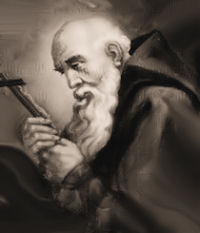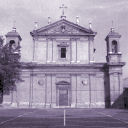Your kingdom come, your will be done, on earth as in heaven. (Matthew 6:10)
When you were young, did you enjoy hearing firsthand accounts of where your parents or grandparents grew up? Didn’t it feel as if you could picture their homes because of the vivid way they described their younger years? Well, Jesus also had a firsthand account of the place where he came from—heaven.
When Jesus spoke about heaven, he wasn’t talking about a distant reality but a real place that is his home. He was talking about a reality that was as near to him as our world is to us. Jesus knew heaven as a place free from pain, weeping, and death (Revelation 21:4) He knew it as a place of everlasting joy and peace. He often spoke of the rewards stored in heaven for the righteous (Matthew 5:12; 6:20; 19:21). The very reason he became man was to testify to the reality of heaven and to make a way for everyone to join him there.
In all his preaching, as well as in his miracles and acts of forgiveness, Jesus sought to give the people a sense of hope: heaven had broken into earth, and everlasting life was now on the horizon! Through his death and resurrection, Jesus overcame the sin that had separated us from God. He brought us close to our heavenly Father and made it possible for us to become citizens of his heavenly kingdom. What’s more, by the gift of his Holy Spirit, he has made heaven a present reality for us. Each and every day, we can experience a touch of heaven as the Spirit pours God’s love into our hearts (Romans 5:5).
So what does this mean as we pray, “Thy kingdom come, thy will be done on earth as it is in heaven?” Good news, that’s what! It means that as we try our best to do God’s will every day, we are aligning ourselves with heaven. It means that the reality and the rewards of heaven will flow into our lives. It means that we can experience all the blessings, gifts, and grace that God has stored up for us in heaven—right here, right now!
“Father, teach me to love heaven as my new and eternal home.”
Isaiah 55:10-11; Psalm 34:4-7, 16-19

 St. Conrad was a Franciscan tertiary and hermit. He was a noble, born at Piacenza, Italy. While hunting, Conrad made a fire that quickly engulfed a neighboring cornfield. A poor man was arrested as an arsonist and condemned to death, but Conrad stepped forward to admit his guilt in the matter. As a result, he had to sell his possessions to pay for the damages. Conrad and his wife decided to enter the religious life. She became a Poor Clare, and he entered the Franciscan Third Order as a hermit. Conrad went to Noto, on Sicily, where he lived the next three decades at St. Martin's Hospital and in a hermitage built by a wealthy friend. During his last years, he lived and prayed in the grotto of Pizzone outside of Noto. His cult was approved by Pope Paul III.
St. Conrad was a Franciscan tertiary and hermit. He was a noble, born at Piacenza, Italy. While hunting, Conrad made a fire that quickly engulfed a neighboring cornfield. A poor man was arrested as an arsonist and condemned to death, but Conrad stepped forward to admit his guilt in the matter. As a result, he had to sell his possessions to pay for the damages. Conrad and his wife decided to enter the religious life. She became a Poor Clare, and he entered the Franciscan Third Order as a hermit. Conrad went to Noto, on Sicily, where he lived the next three decades at St. Martin's Hospital and in a hermitage built by a wealthy friend. During his last years, he lived and prayed in the grotto of Pizzone outside of Noto. His cult was approved by Pope Paul III. 